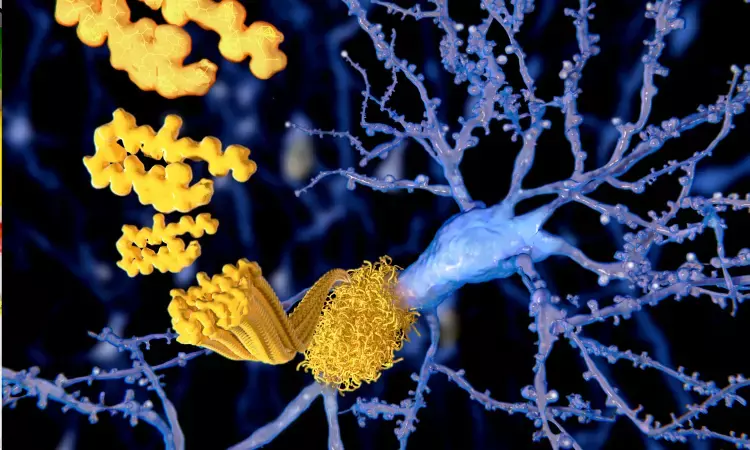- Home
- Medical news & Guidelines
- Anesthesiology
- Cardiology and CTVS
- Critical Care
- Dentistry
- Dermatology
- Diabetes and Endocrinology
- ENT
- Gastroenterology
- Medicine
- Nephrology
- Neurology
- Obstretics-Gynaecology
- Oncology
- Ophthalmology
- Orthopaedics
- Pediatrics-Neonatology
- Psychiatry
- Pulmonology
- Radiology
- Surgery
- Urology
- Laboratory Medicine
- Diet
- Nursing
- Paramedical
- Physiotherapy
- Health news
- Fact Check
- Bone Health Fact Check
- Brain Health Fact Check
- Cancer Related Fact Check
- Child Care Fact Check
- Dental and oral health fact check
- Diabetes and metabolic health fact check
- Diet and Nutrition Fact Check
- Eye and ENT Care Fact Check
- Fitness fact check
- Gut health fact check
- Heart health fact check
- Kidney health fact check
- Medical education fact check
- Men's health fact check
- Respiratory fact check
- Skin and hair care fact check
- Vaccine and Immunization fact check
- Women's health fact check
- AYUSH
- State News
- Andaman and Nicobar Islands
- Andhra Pradesh
- Arunachal Pradesh
- Assam
- Bihar
- Chandigarh
- Chattisgarh
- Dadra and Nagar Haveli
- Daman and Diu
- Delhi
- Goa
- Gujarat
- Haryana
- Himachal Pradesh
- Jammu & Kashmir
- Jharkhand
- Karnataka
- Kerala
- Ladakh
- Lakshadweep
- Madhya Pradesh
- Maharashtra
- Manipur
- Meghalaya
- Mizoram
- Nagaland
- Odisha
- Puducherry
- Punjab
- Rajasthan
- Sikkim
- Tamil Nadu
- Telangana
- Tripura
- Uttar Pradesh
- Uttrakhand
- West Bengal
- Medical Education
- Industry
Semaglutide advisable option for preservation of beta cell function in diabetes patients

Italy: An original research article published in Frontiers in Endocrinology has mentioned that Semaglutide preserves the functioning of β-cell. It may have disease-modifying actions on insulin resistance (HOMA-IR) and prediabetes and Type 2 Diabetes.
Dr Berra et al. and the team from the Center for Outcomes Research and Clinical Epidemiology, Pescara, Italy, evaluated the real-world impact of once-weekly (OW) subcutaneous semaglutide on different end-points indicating metabolic control, cardiovascular (CV) risk factors, and beta-cell function in T2D.
The researchers did this study in five diabetes clinics in Italy. During 12 months, they evaluated HbA1c, fasting blood glucose (FBG), weight, BP, lipid profile, kidney function, and beta-cell function (HOMA-B).
The results of the study could be summarised as follows:
- The study included 594 patients with a mean age of 63.9 years, with 58.7% men.
- The duration of diabetes was 11.4 ± 8.0 years.
- After giving OW semaglutide for six months, HbA1c levels were reduced by 0.90%, FBG by 26 mg/dl, and body weight by 3.43 kg. There was improvement reported in Systolic blood pressure and cholesterol (total and LDL-).
- There were more benefits at 12 months.
- Renal safety was confirmed as Renal parameters like eGFR and ACR remained unchanged after 12 months of treatment.
- There was an increase in HOMA-B after six months from 40.2% to 57.8%.
The researchers discussed that semaglutide benefits metabolic control, multiple cardiovascular risk factors, and renal safety in the real world.
It modifies insulin resistance (HOMA-IR).
Our study confirms the effectiveness of OW semaglutide in a high CV-risk real-world cohort of patients with uncontrolled T2DM. The findings align with existing knowledge in the context of improvement in Fasting Blood Glucose, Body Mass Index, total and LDL cholesterol, and triglycerides.
Further reading:
Berra, Cesare C., et al. “Real World Effectiveness of Subcutaneous Semaglutide in Type 2 Diabetes: A Retrospective, Cohort Study (Sema-MiDiab01).” Frontiers in Endocrinology, vol. 13, Frontiers Media SA, Jan. 2023. Crossref, https://doi.org/10.3389/fendo.2022.1099451.
BDS, MDS in Periodontics and Implantology
Dr. Aditi Yadav is a BDS, MDS in Periodontics and Implantology. She has a clinical experience of 5 years as a laser dental surgeon. She also has a Diploma in clinical research and pharmacovigilance and is a Certified data scientist. She is currently working as a content developer in e-health services. Dr. Yadav has a keen interest in Medical Journalism and is actively involved in Medical Research writing.
Dr Kamal Kant Kohli-MBBS, DTCD- a chest specialist with more than 30 years of practice and a flair for writing clinical articles, Dr Kamal Kant Kohli joined Medical Dialogues as a Chief Editor of Medical News. Besides writing articles, as an editor, he proofreads and verifies all the medical content published on Medical Dialogues including those coming from journals, studies,medical conferences,guidelines etc. Email: drkohli@medicaldialogues.in. Contact no. 011-43720751


